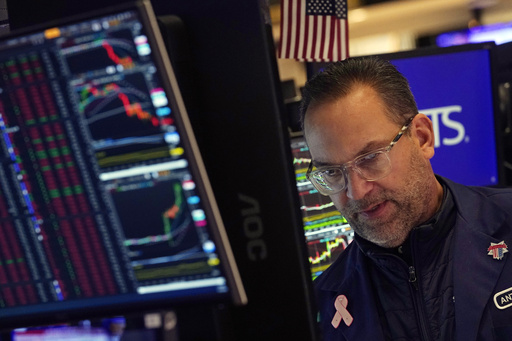NEW YORK — U.S. stocks are showing signs of stabilization on Thursday following a significant downturn the previous day, which marked one of the year’s most challenging trading sessions. The S&P 500 index experienced a midday increase of 0.7%, rebounding from a sharp 2.9% decline when the Federal Reserve indicated it might implement fewer interest rate cuts in the coming year than previously expected. The Dow Jones Industrial Average rose by 255 points, or 0.6%, at 11:45 a.m. Eastern Time, recovering from a steep drop of over 1,100 points on Wednesday. The Nasdaq composite also saw an uptick of 0.9%.
The major indexes are still hovering near their record highs, with the S&P 500 remaining on track for one of its most successful years of the millennium. The sharp drop on Wednesday, however, dampened market enthusiasm, which had already drawn criticism for being overly optimistic and relying on a perfect set of circumstances to maintain high valuation levels.
Market traders are now anticipating that the Federal Reserve could implement only one or two interest rate cuts next year, according to data from CME Group. Some are predicting that no cuts may occur at all, a stark contrast to a month ago when many believed that at least two rate reductions in 2025 were a safe assumption.
Lower interest rates are typically favored by Wall Street, as they can stimulate the economy and elevate investment prices. However, such cuts can also contribute to inflationary pressures.
Darden Restaurants, which manages chains such as Olive Garden, played a pivotal role in lifting market sentiment with a notable share surge of 14.5%. The company reported quarterly profits that outpaced analysts’ expectations and offered a revenue forecast for the fiscal year that was also above estimates. Accenture shares rose by 6.7%, following a strong quarterly profit report that exceeded expectations. CEO Julie Sweet highlighted global growth and raised the firm’s revenue predictions for the current fiscal year.
Despite workers at seven Amazon facilities striking during the crucial holiday season, Amazon’s stock still gained 2.2%. The workers’ union described it as the most extensive strike against the company in U.S. history, but Amazon reassured that it does not anticipate disruptions to its operations.
In contrast, Micron Technology saw a 15.6% drop in its stock price, despite reporting better-than-expected profits. The semiconductor firm fell short of revenue forecasts, with CEO Sanjay Mehrotra indicating that consumer demand is likely to remain subdued in the near future. Additionally, the company offered a revenue outlook for the current quarter that disappointed analysts.
Lamb Weston, known for its potato products, experienced a sharp decline of 21.6% after falling short of earnings and revenue expectations for the latest quarter. Furthermore, the company revised its financial targets for the fiscal year downward, noting that demand for frozen potatoes is softening, especially outside of North America, and announcing the replacement of its CEO.
Meanwhile, the bond market experienced mixed yields following a rise the day before, spurred by expectations of fewer rate cuts in 2025. Recent economic reports produced mixed results. One report indicated that the overall economy grew at an annualized rate of 3.1% during the summer, a faster pace than previously believed. Despite the Federal Reserve maintaining its main interest rate at a two-decade high until recently, the economy has demonstrated remarkable resilience.
Another report indicated that claims for unemployment benefits decreased, suggesting a stable job market. Conversely, a third report revealed that manufacturing activity in the mid-Atlantic region contracted unexpectedly, defying economists’ predictions for growth.
The yield on the 10-year Treasury note increased to 4.55% from 4.52% late Wednesday and from below 4.20% earlier this month. However, the two-year yield, which is more indicative of Fed expectations in the near term, fell back to 4.29% from 4.35%. The rise in longer-term yields has imposed pressure on the housing market, keeping mortgage rates elevated. Homebuilder Lennar’s stock dropped by 5.6% after reporting quarterly results that fell short of analysts’ projections.
CEO Stuart Miller remarked that although the housing market seemed to improve as the Fed lowered short-term interest rates, it faced new challenges as mortgage rates continued to rise. Miller noted that while demand remained strong and supply shortages persisted, affordability constraints due to higher interest rates impacted the company’s performance.
A report released on Thursday, however, suggested a potential positive turn for the housing industry, indicating an uptick in sales of previously owned homes. On the international front, London’s FTSE 100 dropped 1.2% after the Bank of England decided to maintain its current interest rates amid inflation rates surpassing their 2% target, while the British economy shows only limited growth.
Additionally, the Bank of Japan opted to keep its benchmark rate unchanged, causing Tokyo’s Nikkei 225 to decrease by 0.7%. Stock indexes also fell across much of Asia and Europe.
